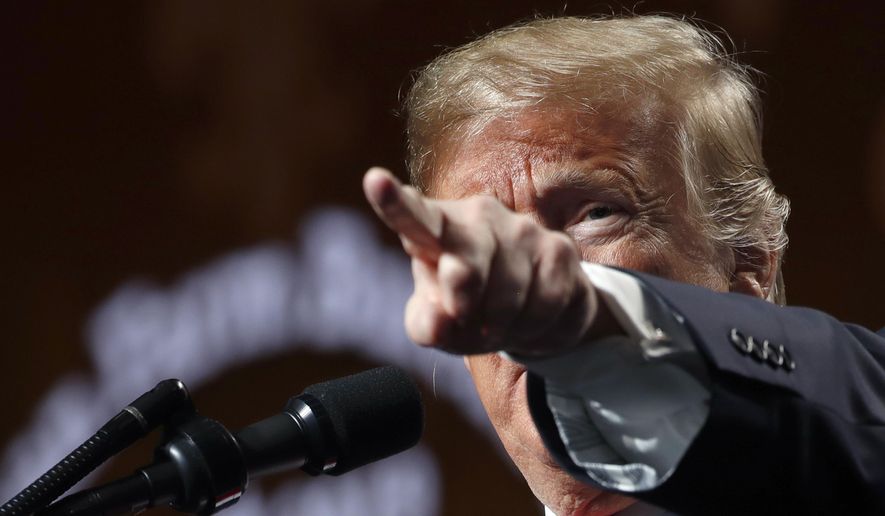President Trump’s prime-time plea to Americans to support his plans for a border wall fell flat, and the public increasingly blames him for the government shutdown.
Not only did last week’s Oval Office address fail to boost support for Mr. Trump’s wall — polling numbers are virtually unchanged compared to a month ago — but Americans aren’t even giving the president the benefit of the doubt anymore.
One poll even found more people believed House Speaker Nancy Pelosi and Senate Minority Leader Charles E. Schumer, who delivered a televised rebuttal to the president, than believed Mr. Trump.
Those are grim numbers for a president who had hoped to win an early victory in the new Congress by asking voters to swamp Democrats with phone calls demanding they accede to his border plans and relent on the partial shutdown now in a record fourth week.
Voters, though, aren’t buying it.
In a new Quinnipiac University Poll released Monday, just 43 percent said they back the wall, compared to 55 percent opposed. A CNN poll on Sunday was similar, with just 39 percent support and 56 percent opposed. Those numbers show no significant movement compared to December.
SEE ALSO: Trump’s TV address flopped as voters believed Pelosi, Schumer
And 56 percent of Americans told Quinnipiac they blame the president for the shutdown, while the CNN poll put the figure at 55 percent. Only about a third in each poll say congressional Democrats bear the responsibility.
“If there’s blame to be taken for the problem we have now with the shutdown, it’s on the president,” said Tim Malloy, the assistant director of the Quinnipiac Poll.
The president hasn’t let the poor reception hinder his enthusiasm for the wall, or the shutdown it spawned.
“We have a very big crisis, a humanitarian crisis on the border. Everybody knows it,” he said Monday morning as he departed the White House for a speech in New Orleans.
Democrats are just as adamant on holding the line, saying they won’t ever allow funding for a wall and won’t negotiate any spending bills until the government is up and running.
“We need to open the government first. The fact that President Trump refuses to consider our proposal means that he’s holding the government and the American people hostage,” Mr. Schumer said Monday, citing Quinnipiac’s numbers.
Some Democrats say they’re willing to talk border fencing later. But Mrs. Pelosi says she won’t entertain that idea even after the government is opened, calling walls “an immorality.”
Republicans say that’s the height of hypocrisy, since most House and Senate Democrats voted for border fence money in spending bills for both 2017 and 2018, and some Senate Democrats also backed massive wall-building campaigns in 2006 and 2013.
Mr. Trump himself made that point during his Oval Office address.
Mrs. Pelosi and Mr. Schumer countered by saying he was maliciously misleading the public.
Neither side came out rosy, with a plurality of voters saying both the president and the Democrats were “mostly misleading.”
“It was almost a wash,” Mr. Malloy said. “People watched this, and they said they’re not getting the full story from either side.”
But stacked head to head, 46 percent said they believed the Democrats more, while just 36 percent believed Mr. Trump.
CNN’s wall question asks if Americans favor building one “along the entire border with Mexico.” That is not part of Mr. Trump’s plans. Instead, he envisions perhaps 700 to 900 miles of the 1,954-mile border covered by barriers.
Quinnipiac’s question asked about “building a wall along the border” but doesn’t include the word “entire.”
Mr. Malloy said there has never been strong support for the border wall, and Americans have consistently opposed it by large margins for at least two years.
“They don’t think the wall will improve security. They don’t think that taxpayers dollars should be put into it,” he said.
But polls are mixed when it comes to how Americans actually see the situation at the border, which Mr. Trump calls a crisis — and which Democrats say is “manufactured.”
The CNN survey said just 45 percent believed there is a crisis, while Quinnipiac’s poll found 54 percent said there was a security crisis and 68 percent said there is a humanitarian crisis.
Other polling tends to back Quinnipiac’s findings, with majorities saying there’s either a “crisis” or a “problem.”
Mr. Trump has said such a crisis creates the opening for him to circumvent Congress and claim emergency powers to employ the military to build his wall — and to raid the Pentagon’s budget for money to do so.
The public is skeptical of that option, with nearly two-thirds saying they oppose the idea — and that could be because most Americans just don’t seem to think a wall will help make the country safer.
⦁ S.A. Miller contributed to this report.
• Stephen Dinan can be reached at sdinan@washingtontimes.com.
• Gabriella Muñoz can be reached at gmunoz@washingtontimes.com.




Please read our comment policy before commenting.